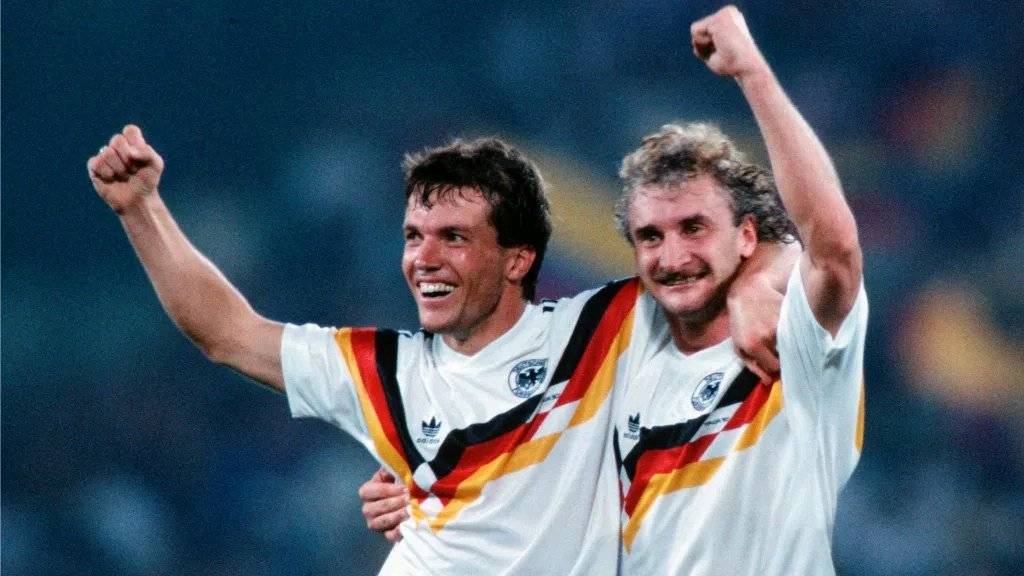Germany is one of the best footballing nations in the world. Whether it's cheap Bundesliga tickets or dazzling wonders on the international stage, there's no denying Germany has contributed as much to football culture as anybody else.But who are the all-time greatest German players? We'll go over our top ten. When Jurgen Klinsmann, Matthias Sammer, and Rudi Voller aren't included, you know they're doing something good...
Oliver Kahn (#10)
Kahn, dubbed Der Titan for his imperious, scary exploits between the pipes, is still regarded as one of the greatest goalkeepers of all time. Bayern Munich won eight Bundesliga crowns, six DFB-Pokals, and a Champions League in more than 600 appearances. Khan was a member of the Nationalmannschaft sides that won Euro 96 and reached the World Cup final six years later.Kahn, the king of big games, is still the only goalie to win the Golden Ball at a World Cup, after leading Germany to the final in Japan in 2002. Despite making a mistake in the team's final defeat to Brazil, Kahn's magnificent performances that summer remain the gold standard by which all goalkeepers in Germany are assessed.
Fritz Walter, No. 9
Walter was an elegant and devastating attacking midfielder who was equally capable of scoring and providing goals. He was the captain of (West) Germany's first World Cup victory in 1954. Walter made 61 appearances for Germany, scoring 33 goals, but it was for his boyhood club, Kaiserslautern, that he is now remembered.
The stadium, which opened in 1985, was named for the player who spent his whole career with the club, scoring 357 goals in 364 league games. Walter was noted for his enjoyment of playing in the rain, to the point where the word "Fritz Walter Wetter" is still used in Bundesliga slang to describe dreadful playing conditions.
We're curious about the weather on the day of the 1954 World Cup final.Miroslav Klose is the eighth player on the list.
Miroslav Klose is far from the best footballer on this list. There are significantly better Germans than the man who was born in the heart of Poland. Few, however, could match the target guy in terms of international efficiency. Klose is Germany's all-time leading scorer, with 71 goals in 139 games, and the most prolific World Cup scorer, with 16.
Klose had a decent, if unspectacular, domestic record, scoring 258 goals in 667 games for a number of European clubs. With Bayern Munich, he won two Bundesliga titles and a Coppa Italia with Lazio. He was a decent player even without his international career. He's a living legend with it. We couldn't possible overlook him.Manuel Neuer, no. 7
The one who is generally credited for revolutionizing a field. Although Neuer did not develop the sweeper-keeper position — there have been numerous examples before him – there's no doubting the Germany and Bayern Munich captain perfected it.
Neuer's footwork is so outstanding that Pep Guardiola famously had to persuade him not to play him in midfield during his time in Bayern. The 36-year-old has played a key role in Bayern's two trebles, in 2013 and 2020, as well as the club's 10-year run of league titles. In recent seasons, there have been repeated requests for Neuer to forfeit his No. 1 spot with the national team, but the 2014 World Cup winner is as important as ever for Hansi Flick's side.
Gunther Netzer, no. 6
Nicknamed ‘Karajan’, after the esteemed Austrian classical conductor, Netzer was a player of rare intelligence, balance and technical genius, considered by many to be the greatest passer in German history. When it comes to the national team,The midfielder's good looks, flowing blonde hair, and playboy lifestyle may irritate team managers, but football fans have given him god-like status. In the early 1970s, the maverick midfielder coordinated Gladbach's back-to-back Bundesliga titles, before going to Real Madrid and repeating the feat later in his career.
Netzer can be summed up in one legendary incident more than any other. During the 1973 DFB-Pokal final, the playmaker – who started on the bench after reportedly telling his boss he was moving to Spain that summer — removed his tracksuit and informed the gaffer “I’m going on to play now” during extra-time. Before going off to Los Blancos, he organized his own introduction and scored the winner. It was actually that simple for him...Uwe Seeler (number 5)
If we ever made another FFT list, it would be the best statues in world football. Seeler was the undisputed star of German football in the 1960s. Outside Hamburg's Volksparkstadion, a massive stone carving of Seeler's naked right foot sits proudly. It's just reward for 490 goals in 580 outings for HSV. The three-time German Footballer of the Year was noted for his power, leadership, aerial skills, and acrobatic overhead kicks, which were remarkable for such a huge boy.
HSV won the German title in 1960 and the DFB-Pokal three years later because to Seeler's unstoppable goal-scoring talents. In 72 international appearances, he scored 43 goals, putting West Germany in contention for the 1966 World Cup. A dejected Seeler is escorted away.
Philipp Lahm (No. 4)
You'd be forgiven for mistaking Philipp Lahm for an accountant rather than one of the best players of all time because he's short, not particularly powerful, fast, or aggressive. The Bayern Munich stalwart lacked muscle, but he made up for it with a mind-boggling football IQ. Former Bayern Munich coach Pep Guardiola previously remarked of the 5ft7 utility guy, "He's one of the most wonderful players I've ever trained in my life." "Even when it comes to the smartest athletes, he is one of them."
After the Catalan coach arrived in 2013, Lahm was rejigged from scuttling right-back to midfield orchestrator, and he was perhaps the greatest in the world in both positions for several seasons.With the Bavarian giants, Lahm won eight Bundesliga titles, six DFB-Pokals, and a Champions League, but his greatest achievements came on the international arena. Lahm lifted the title as captain of the Nationalmannschaft eight years after his amazing goal against Costa Rica in the 2006 World Cup on home soil. That 2014 team was arguably the best in German history, and Lahm was arguably the best of the group.
Lothar Matthaus is number three on the list.
Mattheus' participation in both Euro 1980 and Euro 2000 appears mathematically impossible, yet *checks notes again* he did. Matthaus, who won that inaugural tournament and captained West Germany to victory at Italia 90, even found time to skip Euro 96 during that incredible run.A midfielder, sweeper, leader, and winner, he has more caps (150) and World Cup appearances (25) than any other German player. He was dubbed "fiercest competitor" by Diego Maradona, and former Bayern Munich coach Giovanni Trapattoni put him ahead of Michel Platini and the Argentine. Former Bayern striker Giovane Elber previously told FFT, "There was a hierarchy at Bayern." "Lothar was the huge dog," says the narrator.
Mattheus was the brains and brawn for every team he played for, whether it was Bayern Munich in the 1980s and 1990s or a great Inter Milan squad that won the league and UEFA Cup in the interim.Gerd Muller is number two.
Muller's schooling as an apprentice weaver in small-town Bavaria is credited with developing the stocky, powerful physique that later made him a wrecking ball in the penalty box. He was teased as a child for being short and fat.
Muller, dubbed Der Bomber by German football fans for his propensity to dismantle defenses, scored 365 goals in 427 appearances for Bayern Munich, an average of 0.85 goals per game. Muller, who is known for his size, powerful shot, and acceleration, is Germany's second-highest goal scorer, with 68 goals to Miroslav Klose's 71, although playing 75 fewer games.Muller holds the Bayern Munich and Bundesliga goalscoring records. With eight hat-tricks, he also leads Germany in hat-tricks. Between 1974 to 2006, he held the record for most World Cup goals (14) until it was surpassed by Brazil's Ronaldo.
He was a stats machine, a striker's cheat code at an era when pitches were bad and yellow cards were rare. He was Germany's all-time leading goalscorer.
Franz Beckenbauer, No. 1
Sweepers were ubiquitous in the 1960s, but no one had ever played the position quite like Beckenbauer. With his virtuoso passing range, he not only dictated play from deep, but he also rushed forward with the ball, gliding past opponents to engage in attacks. Der Kaiser was the first to advocate for the libero role.
Beckenbauer won four league titles, four German Cups, three European Cups, and two Ballon d'Ors with Bayern Munich, and one more with Hamburg later in his career, demonstrating his capacity to turn any team into a winner.The defender and captain was instrumental in the national team's victories at Euro 72 and the World Cup two years later. Beckebauer was the most elegant, calm in possession, inspirational, and feared player in history. And no other German is held in such high regard. He was and will undoubtedly always be Germany's finest player.



No comments yet
Be the first to share your thoughts!